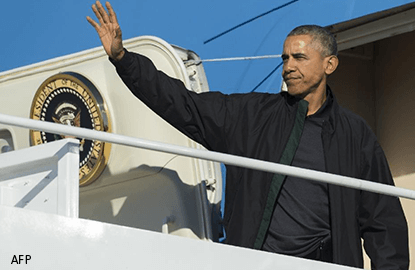
KUALA LUMPUR (Nov 21): The Trans-Pacific Partnership (TPP) agreement has the strongest anti-corruption and transparency standards of any trade agreement in history, United States (US) President Barack Obama said, adding that its execution will encourage greater transparency in the 12 nations party to it.
Speaking at the Asean Business and Investment Summit 2015 today, he said corruption around the world has wasted an enormous sum of money, which could have been used for further development.
"Having to pay a bribe just to start a business or go to school or get a job steals money from workers and families and businesses and it is a violation of human rights, and it is a bad strategy for development.
"Imagine the schools and hospitals and roads and bridges that could be built with that money – investments that would make countries more competitive and more prosperous," Obama said.
"And that's why TPP includes the strongest anti-corruption and transparency standards of any trade agreement in history," he added.
He explained that the TPP requires countries to have laws against corruption and for the countries to enforce those laws.
"So TPP encourages rule of law and stronger, more effective and more accountable governance. That is progress," he said.
Critics of the TPP have pointed to intellectual property and patent protection concerns. One of them is its potential effect on access to medicines.
Obama today reiterated that the TPP is a win-win agreement between the US and the 11 participating countries, saying the agreement is not just a trade pact but also has important strategic and geopolitical benefits.
He said international trade can bring countries and regions closer, noting how European countries had formed the European Union after World War II.
Similarly, he said the TPP will help to advance the economic integration in the region preserving peace and stability.
"Over many decades, the United States helped fashion the international institutions and global trading system that have stitched our economies together and helped prevent another war between major powers.
"There is a link between economic security and national security, and that's at the heart of Asean," said Obama.
Obama noted that the TPP envisions economic relationships to encourage innovation and investment for the mutual benefit of those involved, rather than simply one country extracting the resources of another.
He added that economic disagreements between countres should be resolved peacefully through dialogue and not bullying or coercion.
“We believe in fair competition – which is why TPP is the first trade agreement to level the playing field between private firms and state-owned enterprises.
“And we believe that citizens should be able to explore new ideas and innovate – which is why TPP protects the free flow of data and information across borders and commits our nations to a free and open internet,” he said.
Overall, the TPP will not only set the rules for trade in the Asia-Pacific, but also offers the opportunity to shape the global economy, he said, considering the 12 nations involved account for almost 40% of global gross domestic production and a third of global trade.
“If a country – including other Asean countries – are prepared to meet its high standards, that's a conversation worth having.
“And even countries that may never join TPP will have to compete in a TPP world, giving them an incentive to raise their standards, as well. So countries will have a choice – reform and modernise, or risk getting left behind.
“In this way, I believe TPP will help strengthen the hand of reformers far beyond our 12 initial members,” he said.
The countries party to the TPP are Malaysia, Brunei, Singapore, Vietnam, Australia, Japan, New Zealand, Canada, Mexico, Peru, Chile and the US.
The 12 countries had reached an agreement on the TPP on Oct 5 in Atlanta, the US, concluding the negotiations which began in 2010. However, before the trade pact can be implemented, it has to be passed by the US congress and other national assemblies.